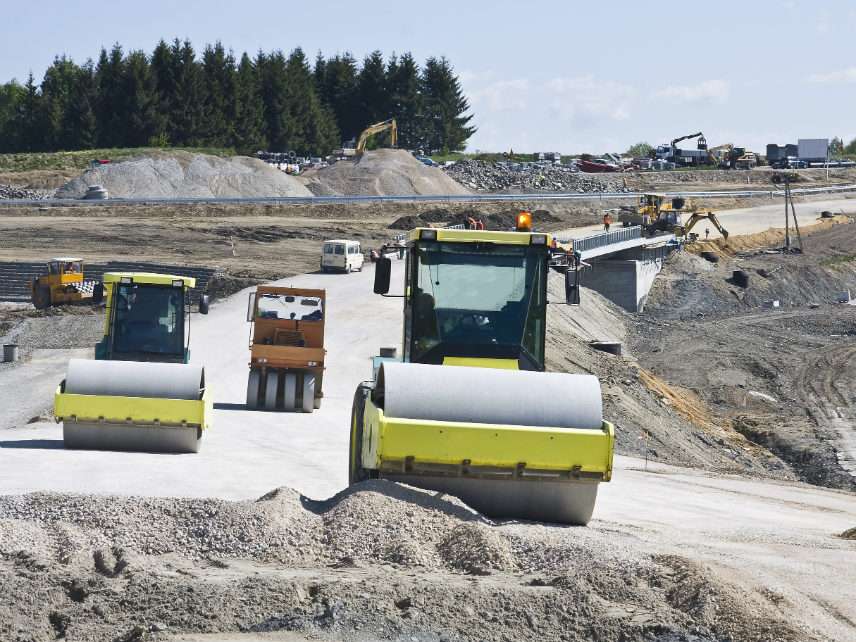SOTU: Trump Promises Streamlined Regulations, More Private Investment in Infrastructure
The president's comments adhered pretty closely to past statements but offered little added detail.

President Donald Trump used his State of the Union address last night to hype his still-forthcoming infrastructure plan, calling on Congress "to produce a bill that generates at least $1.5 trillion for the new infrastructure investment we need"—a 50 percent increase from his previous promise of a $1 trillion plan.
Little was said about how much of that $1.5 trillion would be coming from federal taxpayers, let alone where the administration planned on getting the money. What few specifics the president did cite highlighted his long-stated intention to streamline federal regulations and to shift more of the financial burden onto state, local, and private actors.
"Every federal dollar should be leveraged by partnering with state and local governments and, where appropriate, tapping into private sector investment," Trump said, adding that "any bill must also streamline the permitting and approval process—getting it down to no more than two years and perhaps even one."
The call for streamlining is welcome. Needless to say, some restrictions on government infrastructure projects are essential to protecting property owners and to ensuring taxpayer dollars are dispensed transparently. But others are pointless and duplicative. Current regulations require multiple agencies to issue similar approvals for infrastructure projects, adding years to the time it takes to deliver them. The time it takes to satisfy environmental study requirements has increased from 2.2 years in the 1970s to 6.6 years by 2011, according to one study prepared for the U.S. Treasury.
Trump has already taken some steps to streamline regulations, revoking Obama-era requirements that infrastructure projects account for the effects of climate change, and directing that one federal agency be responsible for issuing environmental permits.
The president's call for more state, local, and private investment offered few details, but was the subject of much criticism from Trump's detractors in the lead up to the speech.
Paul Krugman was fairly typical, declaring on Twitter that Trump's infrastructure plan was "phony, more a privatization scheme than a real plan to build."
A similar line of argument was advanced by Jacob Leibenluft, a senior advisor at the Center of Budget and Policy Priorities, who fretted that Trump's goal of limiting federal commitments to infrastructure spending "would not support many needed projects, while shifting costs to states, localities, and individuals and potentially providing opportunities for lucrative private-sector gains."
A rough draft of funding priorities for the administration's funding priorities included a funding formula heavily titled toward projects that would be able to attract capital and maintenance dollars from non-federal sources. This in itself sounds bad to many on the left, who posit that states and localities just don't have the money for needed infrastructure improvements. Leibenluft writes that "if states and cities are to provide financing, only those states and cities that have the ability and the political will to raise new revenues from taxes will be able to benefit, leaving some of the areas most in need of infrastructure investment even further behind."
This ignores the fact that the states and localities seeking the most in federal infrastructure funding also happen to be some of the country's wealthiest areas. New York and New Jersey are collectively seeking $13 billion for the New York Metro Area's Gateway Project—a rail transit scheme that would be used primarily by local riders traveling to and from the country's richest city.
Projects that rely the most on federal dollars meanwhile have often proven the most unnecessary. Take the Atlanta Streetcar, which relied on the feds to fund half its construction costs, and which has seen its ridership projections fall short while saddling the city with operating costs three times above initial estimates.
Shifting funding burdens onto state, local, and private entities would see more dollars going to projects that local people are actually willing to pay for. That would be the beginning of a far saner infrastructure policy, and it marked one of the few bright spots in Trump's speech.
Rent Free is a weekly newsletter from Christian Britschgi on urbanism and the fight for less regulation, more housing, more property rights, and more freedom in America's cities.


Show Comments (11)